Cuba mission draws local B’nai B’rith members
 B’nai B’rith International has been supporting Jews around the world since 1843. In 1995, the organization began sending humanitarian aid to the Cuban Jewish community. Several Kansas Citians want to become a part of that group which is helping Cuban Jews, so they plan to take part in the B’nai B’rith Cuban Jewish Relief Project Mission in December.
B’nai B’rith International has been supporting Jews around the world since 1843. In 1995, the organization began sending humanitarian aid to the Cuban Jewish community. Several Kansas Citians want to become a part of that group which is helping Cuban Jews, so they plan to take part in the B’nai B’rith Cuban Jewish Relief Project Mission in December.
Mark Wasserstrom, the president of B’nai B’rith Lodge 184, the largest of the three lodges in Kansas City, plans to participate in the mission scheduled Dec. 6 to 13. He is recruiting others to join the group along with Rabbi Jacques Cukierkorn, who is a native of Sao Paulo, Brazil, and is the rabbi of Temple Israel of Greater Kansas City. Wasserstrom said B’nai B’rith just completed a mission to Cuba in June and has another one planned in November as well. Officials hope 25 to 40 people participate in the December mission.
Participants, who must be members of B’nai B’rith, will spend seven days and six nights in Havana, Santiago and Guantanamo in Cuba and one night in Miami. The itinerary includes sharing erev Shabbat and a Shabbat meal with the Jewish community of Santiago; meetings with the leaders and members of the Cuban Jewish community; and a trip to the Holocaust Memorial in Havana.
Wasserstrom is interested in the project because he thinks establishing an ongoing relationship with the Jewish community in Havana is a worthwhile project.
“Since the official count of the number of Jews in Cuba is 1,200, there is such a small Jewish community that I think the Jewish community of Kansas City could actually manage to have a significant impact on the community in Cuba,” Wasserstrom said.
“The other part of the project that is exciting is that there are enormous historic pressures to open Cuba back up. So when Cuba opens and the U.S. blockade ends and the remaining restrictions on travel end, I think that we will see a significant increase in dealings with Cuba,” he continued.
The U.S. government restricts travel to Cuba for American citizens. Restrictions have been modified over the past few years and Cuban-Americans can now travel freely to the country. Students and religious missionaries are also allowed to travel to Cuba if they meet certain restrictions. It is legal for U.S. citizens to take this trip because B’nai B’rith has official religious missionary credentials through the U.S. Treasury department.
The B’nai B’rith website reports that the Jewish community in Cuba, although small, is thriving.
“When the Soviets left in 1990, the Cuban government declared that communism and religion could coexist. The Jewish community is now enjoying a revival. The disarray of the Soviet era has given way to a true sense of cohesiveness today. They are Jews that the rest of the world can look to with pride,” notes the website.
“Although there is no anti-Semitism in Cuba, daily life is very hard for all Cubans. The average person earns between $15 and $35 per month. Food is rationed. Not many quality items are available in pesos, and must be purchased with U.S. dollars (something not everyone has access to.) A doctor earning $35 per month may hope to supplement his income as a cab driver or a waiter, who can earn $10 a day in tips,” it continues.
Because of the economic hardships Cubans face, Wasserstrom said those who plan to participate — all participants must be B’nai B’rith members — are expected to take at least 15 pounds of supplies to be given as a gift to the Jewish community in Cuba. Upon registration, B’nai B’rith will provide a list of “needs” to participants, which often include medicine and cultural/religious items such as Judaica and books.
In addition to the humanitarian supplies and Judaica B’nai B’rith has been supplying the Cuban Jewish community, it has also sent mammography machines to the hospital and medical texts to the University via the Jewish community.
Rabbi Cukierkorn said Cuba has been described to him “as the Jurassic Park of socialism.”
“Things are changing very little, but it’s fascinating to go see what a socialist nation really looks like,” he said.
Through his book “Accesible Judaism: A Concise Guide” (in Spanish as “HaMadrij: La Guía”), Rabbi Cukierkorn has been in contact with several Cuban Jews.
“When I wrote my book many, many years ago (2004), the first thing I did was to send 12 copies of the book — one for each synagogue — to the B’nai B’rith Cuban Jewish Relief Project,” Rabbi Cukierkorn said.
He said that because there is such a desire for Jewish information, the book is of great value there.
“I’ve received emails from people thanking me for the book,” Rabbi Cukierkorn said.
The Reform rabbi has also seen a picture of the library where there are several copies of his book on a shelf at the Patronato, which functions as Cuba’s Jewish community center and is a part of the largest synagogue in the country.
“There is a picture of an open book and you can see that the pages are used, that people are reading it. What could give a writer more joy,” Rabbi Cukierkorn said.
Rabbi Cukierkorn will take 100 copies of his book to Cuba, compliments of Lodge 184. The members of Temple Israel are giving Rabbi Cukierkorn the time off to take this trip. He is doing so just as any other participant, not as the group’s rabbi.
Wasserstrom is happy that Lodge 184 is able to sponsor Rabbi Cukierkorn on this trip.
“He has a reputation far beyond Kansas City, so it just seemed to make a great deal of sense to get somebody who is sensitive to issues throughout South America,” Wasserstrom said. “Hopefully B’nai B’rith will realize what an important asset Rabbi Cukierkorn is so that he can contribute not only to the richness of Jewish life in Kansas City but that he can share his knowledge and experience with B’nai B’rith and help guide whatever efforts B’nai B’rith can pursue.”
While it’s been said that Jews don’t face anti-Semitism in Cuba, Wasserstrom is worried that Jews are beginning to face more anti-Semitism in other parts of South America.
“Iran has been giving a great deal of foreign aid to South American countries and distributing Arab propaganda along with it. That’s why in December 2011 B’nai B’rith had its first international policy conference in South America in Montevideo, Uraguay,” Wasserstrom explained.
While the B’nai B’rith International organization may be struggling a bit retaining its members — for example membership has slipped tremendously here in Kansas City’s three chapters — Wasserstrom said one of B’nai B’rith’s strengths has always been monitoring world events as they impact the global Jewish community.
“So when we have a situation such as a new strain of anti-Semitism evolving in South American, B’nai B’rith is one of the few Jewish organizations that can effectively address the situation. To have an opportunity to go on a mission to Cuba and to participate at any level in a new program that is of some significance is exciting,” Wasserstrom said.
The registration deadline for this trip is Nov. 1. To learn more about the trip, visit the website at http://www.bnaibrith.org/cubanjewishrelief.cfm or contact Rabbi Cukierkorn through his website, www.rabbicukierkorn.com. or call him at 913- 940-1011.



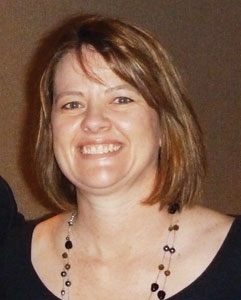 OCCUPATION: Administrative assistant, Jewish Community Center’s summer camps and community volunteer
OCCUPATION: Administrative assistant, Jewish Community Center’s summer camps and community volunteer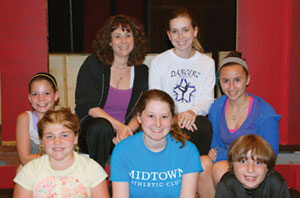 THE KING AND I — Several members of the Jewish community have roles in the Jewish Community Center’s upcoming production of “The King and I.” It opens July 14 and runs through July 29. You can catch Francine Gollub, Leah Cole, Leah Selmmons, Alexandra Fulford, Carolyn Braverman, Maya Schreiber and Noah Waldman in this Rodgers and Hammerstein family favorite that shares the story of the king of Siam and his relationship with Anna Leonowens, who travels from England to tutor the king’s children. It will be performed in the White Theatre. Ticket information is available online at jcckc.org/boxoffice or by calling 913-327-8054.
THE KING AND I — Several members of the Jewish community have roles in the Jewish Community Center’s upcoming production of “The King and I.” It opens July 14 and runs through July 29. You can catch Francine Gollub, Leah Cole, Leah Selmmons, Alexandra Fulford, Carolyn Braverman, Maya Schreiber and Noah Waldman in this Rodgers and Hammerstein family favorite that shares the story of the king of Siam and his relationship with Anna Leonowens, who travels from England to tutor the king’s children. It will be performed in the White Theatre. Ticket information is available online at jcckc.org/boxoffice or by calling 913-327-8054.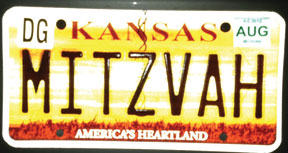
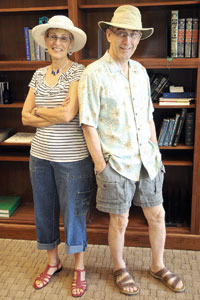 Rabbi Alan Cohen is retiring. What’s new about that? He retired in 2008 from the pulpit of Congregation Beth Shalom after serving the congregation for 19 years, didn’t he? True. But last year the congregation came calling again, asking him to serve one more year in an interim capacity.
Rabbi Alan Cohen is retiring. What’s new about that? He retired in 2008 from the pulpit of Congregation Beth Shalom after serving the congregation for 19 years, didn’t he? True. But last year the congregation came calling again, asking him to serve one more year in an interim capacity.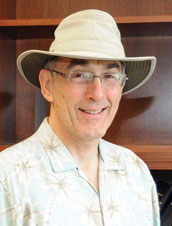 Rabbi Cohen said returning to the pulpit wasn’t that difficult because it was a job that he had always been very comfortable with.
Rabbi Cohen said returning to the pulpit wasn’t that difficult because it was a job that he had always been very comfortable with.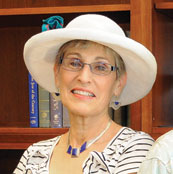 Linda Cohen is retiring not only from many of her duties as a rebbetzin but also as a teacher. Cohen has coordinated the community conversion class since its inception in 2003.
Linda Cohen is retiring not only from many of her duties as a rebbetzin but also as a teacher. Cohen has coordinated the community conversion class since its inception in 2003.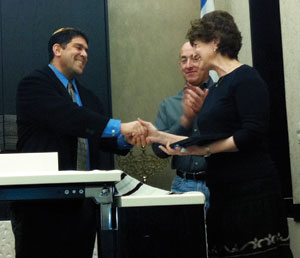 Harold Schlozman is no stranger when it comes to a hospital setting — he spent years working as a pharmacist at the Veterans Hospital in Kansas City. He saw patients on the various wards who were anxious, depressed and in various stages of illness. It was that very setting that inspired him to become a Spiritual Care Volunteer through the Jewish Community Chaplaincy Program housed at Jewish Family Services.
Harold Schlozman is no stranger when it comes to a hospital setting — he spent years working as a pharmacist at the Veterans Hospital in Kansas City. He saw patients on the various wards who were anxious, depressed and in various stages of illness. It was that very setting that inspired him to become a Spiritual Care Volunteer through the Jewish Community Chaplaincy Program housed at Jewish Family Services.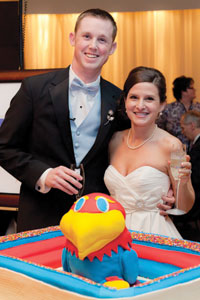 When Ariella Ben-Aharon and her husband Roy became engaged they knew they wanted to have a kosher wedding reception.
When Ariella Ben-Aharon and her husband Roy became engaged they knew they wanted to have a kosher wedding reception.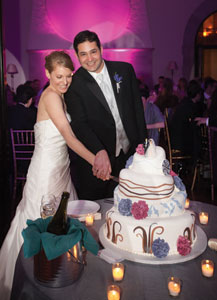 Rabbi Segal also recommends Sherrie Ortiz of Sherrie’s Cake Magic. Ortiz has made wedding cakes for the past 26 years. She made her first kosher cake this January.
Rabbi Segal also recommends Sherrie Ortiz of Sherrie’s Cake Magic. Ortiz has made wedding cakes for the past 26 years. She made her first kosher cake this January.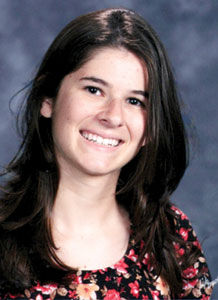 The Girl Scout slogan urges its Scouts to “do a good turn daily.” Seventeen-year-old Sarah Herman has taken that to heart.
The Girl Scout slogan urges its Scouts to “do a good turn daily.” Seventeen-year-old Sarah Herman has taken that to heart.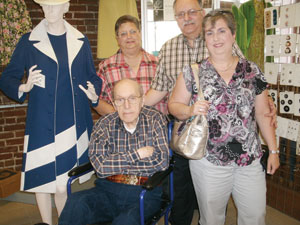 A STITCH IN TIME — The Lebovitz family recently took an excursion to the Kansas City Garment District Museum, located at 801 Broadway. The museum is showcasing Eugene Lebovitz’s designs from when he worked for YouthCraft. The company relocated Lebovitz and his family here from New York City in 1959. A few years after that, Fashionbilt courted Lebovitz to be that company’s head designer. For more than 20 years, his designs were deemed successful. He retired from Fashionbilt in the ’80s after suffering a heart attack and owned Abe’s Taylor Shop, known by many as “the tailor’s tailor!” Over the years Lebovitz also made and showed intricate thread sculptures, tapestries, banners — one of which hung in Jerusalem for the city’s 25th anniversary — and in the late ’70s he made a robe for Jerusalem’s chief rabbi. The Kansas City Garment District Museum is open to the public on Fridays from 10 a.m. to 3 p.m. or for private tours by calling 913-205-8520.
A STITCH IN TIME — The Lebovitz family recently took an excursion to the Kansas City Garment District Museum, located at 801 Broadway. The museum is showcasing Eugene Lebovitz’s designs from when he worked for YouthCraft. The company relocated Lebovitz and his family here from New York City in 1959. A few years after that, Fashionbilt courted Lebovitz to be that company’s head designer. For more than 20 years, his designs were deemed successful. He retired from Fashionbilt in the ’80s after suffering a heart attack and owned Abe’s Taylor Shop, known by many as “the tailor’s tailor!” Over the years Lebovitz also made and showed intricate thread sculptures, tapestries, banners — one of which hung in Jerusalem for the city’s 25th anniversary — and in the late ’70s he made a robe for Jerusalem’s chief rabbi. The Kansas City Garment District Museum is open to the public on Fridays from 10 a.m. to 3 p.m. or for private tours by calling 913-205-8520.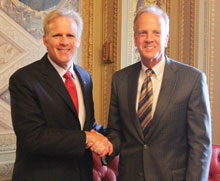 KANSAS SENATOR SUPPORTS ISRAEL — U.S. Sen. Jerry Moran (R-Kan.) welcomed Israeli Ambassador Dr. Michael B. Oren to the U.S. Capitol June 19. During the meeting, Moran and Oren discussed a range of topics, including the recent escalation of rocket attacks from Gaza, improved anti-ballistic missile defense technology, security issues along Israel’s border with Egypt and the P5+1 talks with Iran in Moscow. They also discussed their support for continued cooperation between the United States and Israel on security issues, including cyber threats. “The deep friendship that exists between the United States and Israel is a result of our shared values,” Moran said. “The strength of that special relationship is critical at this time as Israel faces threats in Gaza, Egypt, Syria and Iran. I expressed my support to the Ambassador and pledged to stand with Israel as it confronts the challenges of our time.”
KANSAS SENATOR SUPPORTS ISRAEL — U.S. Sen. Jerry Moran (R-Kan.) welcomed Israeli Ambassador Dr. Michael B. Oren to the U.S. Capitol June 19. During the meeting, Moran and Oren discussed a range of topics, including the recent escalation of rocket attacks from Gaza, improved anti-ballistic missile defense technology, security issues along Israel’s border with Egypt and the P5+1 talks with Iran in Moscow. They also discussed their support for continued cooperation between the United States and Israel on security issues, including cyber threats. “The deep friendship that exists between the United States and Israel is a result of our shared values,” Moran said. “The strength of that special relationship is critical at this time as Israel faces threats in Gaza, Egypt, Syria and Iran. I expressed my support to the Ambassador and pledged to stand with Israel as it confronts the challenges of our time.”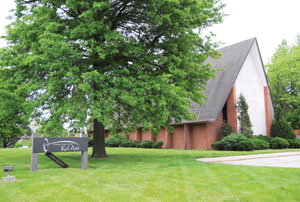 Congregation Kol Ami is giving its building back to Bank of Prairie Village. Kol Ami President Nadine Gordon said the decision was made at a special board meeting held May 6.
Congregation Kol Ami is giving its building back to Bank of Prairie Village. Kol Ami President Nadine Gordon said the decision was made at a special board meeting held May 6.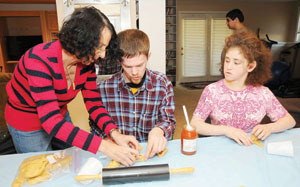 Almost four years ago Rabbi Binyomin Gonsher, a Kollel rabbi, saw a need in the local Jewish community. He and Allan Gonsher, who happens to be his father, started Ahoovim, a group for Jewish adults with special needs to enjoy social events and to learn more about Judaism.
Almost four years ago Rabbi Binyomin Gonsher, a Kollel rabbi, saw a need in the local Jewish community. He and Allan Gonsher, who happens to be his father, started Ahoovim, a group for Jewish adults with special needs to enjoy social events and to learn more about Judaism.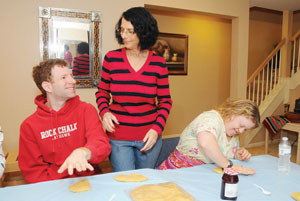 Ken Malashock has been active in the group for the past two years. His mother, Gina Malashock, says, “Every program is planned around a Jewish holiday or a Bible story. They do the blessings before they eat; all the food is kosher; and it is great exposure for Ken. He has gotten so much out of it!”
Ken Malashock has been active in the group for the past two years. His mother, Gina Malashock, says, “Every program is planned around a Jewish holiday or a Bible story. They do the blessings before they eat; all the food is kosher; and it is great exposure for Ken. He has gotten so much out of it!”